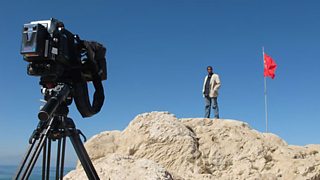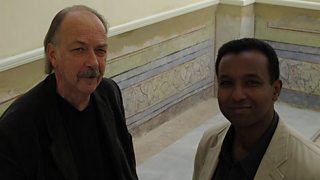The Ottomans: Europe's Muslim Emperor, the story behind the documentary
Aaqil Ahmed
Head of ������̳ Religion & Ethics
Tagged with:
Hello, my name is Aaqil Ahmed and I am the Commissioning Editor for Religion and Head of Religion and Ethics at the ������̳. I’ve written a number of times about the work of our department on the About the ������̳ Blog - you can read some of those posts . Today, I want to introduce a new three part documentary series entitled , that begins this Sunday at 9pm, on ������̳ Two.
To really understand the Middle East today and the relationship between Europe and Islam, you have to understand the Ottoman Empire, how it was created, how it evolved, how it ruled, how it collapsed and what it was followed by. Presented by Rageh Omaar, the series traces the 600 year history of the Ottoman Empire, and asks, was it an Islamic empire as most historians would tell us? Or was it something far more complicated?
The forgotten story of the world's last Islamic Empire in Europe and the Middle East.
The series isn’t just saying "let's look at 50 years of history or look at the 17th century" – it’s my belief we could have made a fantastic series alone looking at (or Suleiman the Law Giver), for example. Instead, we’re focusing our series on who these people are and why their story is told in the way it is. What can we learn from the empire they created and the state that followed it? And what does it tell us about the world we live in today?
The easy thing to do would have been to make a documentary series about how great the Ottomans were, or a film about how blood thirsty they were. It’s actually a lot harder trying to navigate that middle ground and say "well, hang on, in their own time they were considered ‘great’ - by our time they were terrible, but compare them to the other empires around and if you were in a minority that's the one it may be more preferable to be in."

Filming presenter Rageh Omaar on top of the Fortress of Van in Eastern Turkey
Rageh and I had a vision: we wanted to tread that middle ground. The whole point of this series is that we cannot carry on not knowing enough about this empire. Making this series has only come about because of a lot of previous projects I’ve been involved in, from the first ever documentary on the Hajj, the first film about the Sunni-Shia split, the first on the Koran, and the first series on the at the ������̳ two years ago.
Those different projects have given me a level of programme making experience, helping me understand what can be done and what the pitfalls are. What I know now compared to 1992, when I first attempted to make this idea, is that a straightforward history would not have worked - the contextualisation is very important.
Of course, one of the biggest challenges in making this documentary series has been what do we tell and not tell? This is not a kitchen sink approach to the Ottoman history. It can’t be. And of course, since we've finished it - and we will have had another look at it before transmission – President Morsi is no longer in power in Egypt. We also have to bear in mind the situation in Syria and how that is referred to in the series. In making this programme, the conversation is on-going in terms of what should we do and what shouldn't we do?
Additionally, there were considerable debates about how to cover a subject like the Crimean War for instance. If this was a 10 part series, then there's probably a whole episode on the Crimean War. However, it's a three part series, so there is time only to reference it – by describing how the British and French moved from an anti-Ottoman stance to one of support.
Stylistically too, we made a deliberate decision to make use of a lot of contributors. We have some of the best people in the series, all articulating often complex histories about the period. As a programme maker I'd rather hear from them - you get a fantastic range of opinions – rather than one voice reading a scripted narrative.

Rageh Omaar with one of the contributors, historian Heath Lowry
Multiple contributors also open out the knowledge too and can result in some unexpectedly interesting points being made in the programme. I met Mary Beard's husband at a lunch for example where he explained he's an expert on Byzantium. I explained we were making this series and promised to get the producers to get in touch with him, which then led on to one of the really interesting insights in the programme: A cannon builder of the biggest in the world at the time, offered his cannons to the Byzantines - they couldn't afford it, but the Ottomans could, and the rest is history.
Producers and researchers can look in as many books as possible and not have that kind of knowledge as quickly to hand as say interviewing an expert. So that's why, on stories like this, it’s better to have more experts on a subject which the majority of our audience will have little knowledge about, than it is to have the presenter wandering around just telling people.
I think there will be communities of viewers as opposed to one archetypal 'viewer' of this documentary. I think if you're a viewer who likes history programming, you'll really enjoy this. If you're a viewer who's interested in the Middle East, you're going to find this fascinating. And there will be, I am sure, viewers who disagree with it. That's the key to tackling a subject like this. There are many ways to tell it, and many ways to take it.
What I would hope is that a lot of people will come away from this saying 'that was really interesting: I didn't know that' and maybe have a different perspective on what they see around them.
is Commissioning Editor for Religion and Head of Religion and Ethics at the ������̳.
- begins on ������̳ Two on Sunday 6 October at 9pm.
